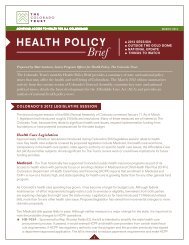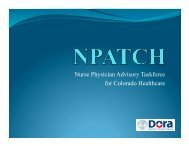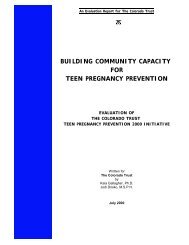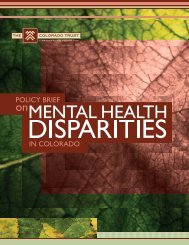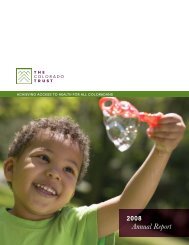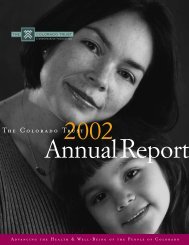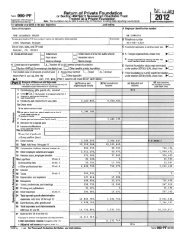After-School Initiative's Toolkit for Evaluating
After-School Initiative's Toolkit for Evaluating
After-School Initiative's Toolkit for Evaluating
You also want an ePaper? Increase the reach of your titles
YUMPU automatically turns print PDFs into web optimized ePapers that Google loves.
Cultural Competency<br />
As communities are becoming more diverse, knowledge, com<strong>for</strong>t and respect <strong>for</strong> others who are different than oneself becomes<br />
increasingly important. There are many definitions of cultural competency; the definition used in The Colorado Trust’s <strong>After</strong>-<strong>School</strong><br />
Initiative is:<br />
Cultural competency is an ongoing process and practice that builds the capacity of organizations and individuals to understand, accept, value and honor the unique<br />
contributions of all people, including but not limited to people’s: ability, age, disability, ethnicity, gender, gender identity, geographic region, health, language, mental<br />
health, race, religion, sexual orientation, socioeconomic status and spirituality.<br />
This question set contains questions on general feelings of respect <strong>for</strong> and com<strong>for</strong>t with others who are thought to be “different,” as well<br />
as questions that focus more specifically on culture, race and ethnicity as a cultural group. Questions within the culture, race and ethnicity<br />
category assess com<strong>for</strong>t and respect <strong>for</strong> other cultures as well as knowledge and pride in one’s own culture. Note that all of the questions<br />
related specifically to culture, race and ethnicity as a <strong>for</strong>m of cultural competency are listed within the advanced question set, indicating that<br />
they are more appropriate <strong>for</strong> older youth. Many younger participants are not yet aware of cultural, racial or ethnic terminology.<br />
ASI requirement: If the cultural competency domain is selected, programs may choose either the basic or advanced question sets.<br />
Questions in bold are required.<br />
Cultural Competency (Basic Set)<br />
Because I came to [this program]…<br />
YES KIND OF NOT REALLY<br />
a. I know more about the good things that people<br />
who look or sound different than me have done<br />
(like African Americans, Mexican Americans,<br />
Native Americans, Asian Americans and others)................................... ...................... .............................<br />
b. I talk more with young people who look or sound<br />
different than me ............................................................................................. ...................... .............................<br />
c. I feel more com<strong>for</strong>table being around young<br />
people who look or sound different than me ........................................... ...................... .............................<br />
d. I understand that someone who looks or sounds<br />
different than me may not be that different after all.............................. ...................... .............................<br />
<strong>Toolkit</strong> <strong>for</strong> <strong>Evaluating</strong> Positive Youth Development 23



